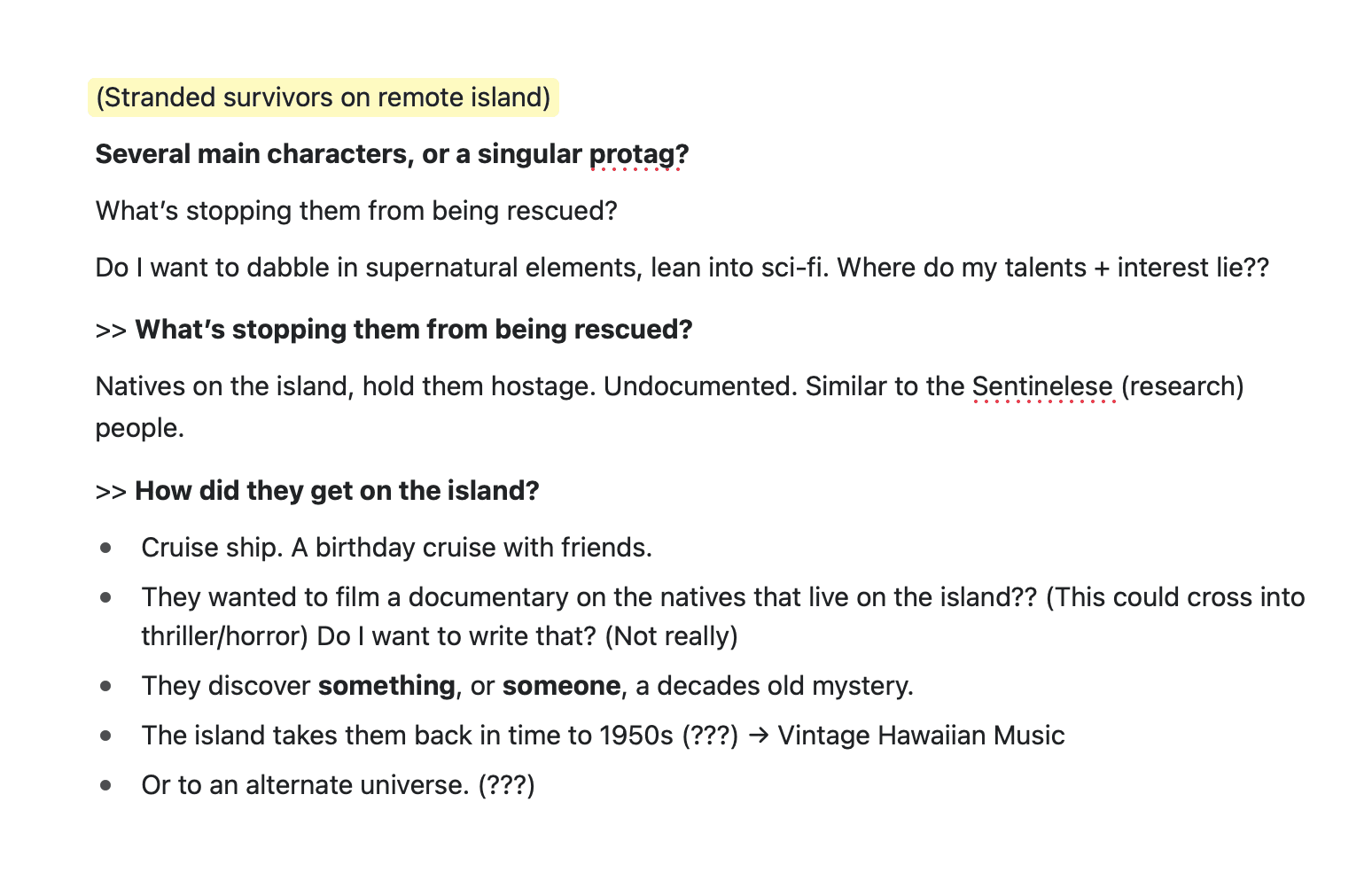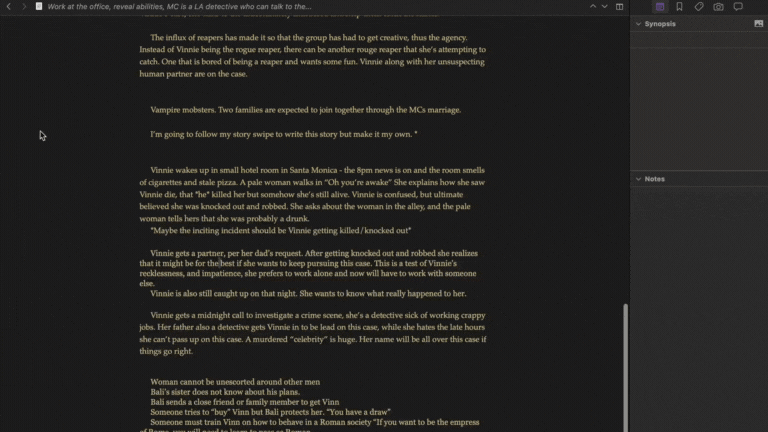How I Braindump Before Writing
Nov 21, 2024
Starting Your Novel
•
N/A
Ideas? A dime a dozen.
I have a spreadsheet full of disjointed “ideas” that on their own, aren’t worth much. But that’s how most stories start with a spark ✨ of an idea and then that’s built upon with story elements.
To do that you need to turn that idea into a plot, into characters, into dialogue, theme, chapters, and scenes and so on right?
^^That’s not always easy. It takes time to go from idea to story. And how you do that, depends on your writing style.
Some writers can just blot it out on the spot. Everything's in their head and when they sit down to write it comes out. Not perfectly, but it’s there and forming.
For others (I’m in this camp) we’ve got to plan it out. We’re still blotting but we’re getting it down on paper — making it make sense before moving to the next step.
I call this ^^ a brain dump - and it’s exactly what it sounds like: an unfiltered, anything-goes session where you get all your thoughts onto paper. No pressure and no rules. No bad ideas. No editing.
You’re focusing on that potential idea and annexing it out. And this does a few things for us —
Gives us clarity: Mental space 0 and ready to reload.
Allows creative freedom: Similar to free writing a brain dump is whatever goes. It's one of those spaces that's FYEO(for your eyes only) unless you're working with a book coach or ghostwriter. And those are still no judgment zones. Point being… What's here will be refined so let the ideas flow.
Momentum: When an idea is new, it’s exciting. You’re motivated and focused. But trying to jump straight into writing or outlining can slow that momentum. A brain dump does the opposite. It turns a vague idea into something tangible.
This is why in most things I write. Books (F & NF), my editorials, reviews, etc. I like to begin with a brain dump. I did it with this editorial. 😉
So in this editorial, I’m sharing a behind-the-scenes peek into how I do that. By the end of this editorial you’ll know all about brain dumps, how they can benefit your writing and last how to take your brain dump and begin forming an outline.
How To Go From Idea To Brain Dump
It starts with a simple, sometimes, silly idea. I love the way Rayne Hall teaches ideation. (non-aff link) Start with a few nouns, (people, places, things(careers, hobbies, dreams, experiences, etc) And combine them.
I have an idea bank or (story bank) on Asana. I want to write more about this when I have a system I love.
And keep this list somewhere safe where you can always add to it. This is perf if you’re all out of ideas.
But it’s unlikely you are. Most story ideas are random or inspired. I've been rewatching Lost. (Stranded survivors on remote island) is an idea I can take and build up n' out — make it my own. So whatever your idea.
You want to get that down first. For this example I’m going to with the Lost inspired idea. There’s no framework for brain dumping. I’ve played around with a few different styles. The brainstorm web works great and is more organized. But I prefer to simply dump.
Here’s a snap of a brain dump I worked on for 5 or so minutes around the (Stranded survivors on remote island) idea.

You can see I’m throwing ideas out, seeing if they stick. Talking to myself. A lot of questions on where my talent lies and my interests.
Although it's fairly random, I do have a list of key questions I ask myself when brain dumping. You can download my brain dump questionairre → here
You’re probably catching on that a brain dump isn’t only for building up and idea, but also checking if said idea is solid, and if you’re the right writer for it. Although I only spent 5 minutes on the above brain dump, I quickly realized I didn’t want to write a story about stranded survivors on a remote island.
I’d much rather watch it.
Maybe someday I will, normally I’ll file away the idea and mark it as such. But for this editorial I'm going to press the idea a little further.
However, if the idea is solid, you build up on it, and you realize you’re the perfect writer for the story — your brain dump will be a lot more fleshed out.
Here a brain dump for a short story I wrote. The idea was solid and I was the perfect candidate to write it. Once I’m done brain dumping, I move into a framework outline.

Going From Brain Dump To (Framework) Outline
In the BC writing room, there’s two kinds of outlines we do. The first is a framework outline and then a chapter-by-chapter (sometimes scene-by-scene) outline.
The latter of course being a lot more detailed, several pages, and a doc you might send off to an editor. The former however pairs perfectly with your brain dump.
The brain dump being a messy desk of ideas. The framework outline comes in, cleans up, and makes sense of your brain dump. It carefully picks from your brain dump and organizes it into a story structure. You’re likely familiar with several story structures.
The most popular being Freytag’s Pyramid based on Shakespeare plays and Greek tragedies.
There’s also:
The Hero’s Journey
The 3-act Structure
Save The Cat
And a dozen more. This is where experimentation comes in. I talk about this in my upcoming book: Before The Book.
There comes a point when you’ve gotta hop out the books, out of theory, put your head down, pick your pencil up and practice.
You might end up coming up with your own story structure that works perfectly for you and your books. But to get there, you’ve gotta learn what works for you, and what doesn’t.
My advice here is to start with premade structure. Get used to how a story unfolds using those.
Stick with that until you’re comfortable. Kinda like having training wheels until you’re ready to ride on your own. The point for now is to pick and have a structure to unload you brain dump into. Using Freytag’s Pyramid and the (Stranded survivors on remote island) idea. Let’s see what I can do.
Introduction (Exposition + Inciting Incident):
( I like to use the 5 W's of journalism when doing exposition, in any case I would refer back to my brain dump for this) Our main character, Zoey goes on a South Pacific birthday cruise to celebrate her 30th birthday - everything is going swell until the ship crashes and begins to sink.
12 hours later — Zoey miraculously washes up on shore with one other survivor (the hot guy from room 31, her toxic ex, a random baby/kid, the captain, an elderly couple) There’s a lot of ways I can take this depending on the genre/theme. ! I wanted to note its okay to still brainstorm at this stage, and build up the character(s).
For example I'd also add some background to our main character here, even if I won't be using it just yet:
She's at a crossroads in life: recently divorced, considering a career change from corporate law
Her friends surprise her with an upgraded suite and special activities planned throughout the week (something to show the close bond she has with her friends, etc.)
Brief glimpses of brewing storm and captain's concerned discussions with crew (like this is unexpected, kind of weird, unheard of situation. Adds to the mystery. (needs research)
Massive storm hits unexpectedly during night three of the cruise
Zoey gets separated from her friends during evacuation
Ship breaks apart; Zoey loses consciousness in the water
! And I’m not afraid to get things wrong either, I’m not a walking encyclopedia, much to my dismay, this would be a FYEO document as far as I’m concerned. If I’m unsure or straight up don’t know something I will add a note that it needs research.
Rising Action:
(Here I want to build the stakes, tension, suspense - If I spend more time with the idea I would have gone into a little more detail. Some obvious questions to rise are of survival, getting rescued, - if I introduced island natives, are they friendly, hostile? If I introduced some sort of sci-fi time travel, how does this affect the characters? (Mentally + Physically) And also play around with relationships. Basically, I'd pop my dramatic Q here.)
~Some bullet points:
Wakes up alone on an unfamiliar beach, surrounded by wreckage
Initial survival challenges: finding fresh water, shelter, food
Discovers evidence that others survived but no sign of current inhabitants
Strange occurrences: missing supplies, unexplained noises at night, footprints appearing and disappearing (???)
…and I would continue to do this for each story point. I’d also scribble down setting elements, themes, character arcs, and so on. Whatever was necessary for this story. It’s a framework outline, it’s not overly detailed but it’s detailed enough for me to move onto a chapter by chapter outline.
For some writers, the framework outline is enough to begin writing. You’ll learn what works best for you as you practice.
Either way from here you should be ready or close to being ready-to-write. In my writing room brain dumps remain a crucial part of getting to this stage. I hope this has helped you, inspired you, or provided a cheat sheet for you draft.
Author's Notes
I can't stress enough the importance of exploring what fits your writing style a this stage, this works for me. Play around with it and see how you like it and don't feel discouraged if it doesn't fit.
¹ Freytag's Pyramid Guide: https://prowritingaid.com/freytags-pyramid
